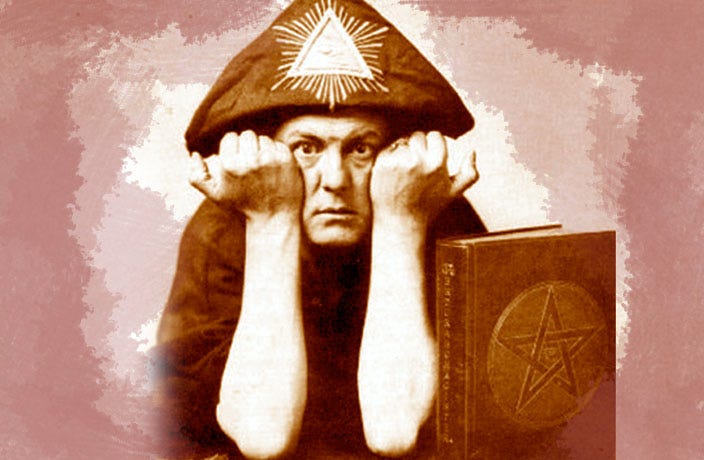Didn’t expect it to take this long, really, but there you go. A “real” magician (of some kind, if you can call an apparent fan of the pseudo-rosicrucian quasi-theosophical “New Thought” movement, the precursors of the “7 Habits of Highly Effective People” Antony-Robbins self-help-book crowd, any sort of magician) has apparently started taking umbrage to some of my comments about the wild and crazy state of the modern occultism scene, and particularly he seems to be under the impression I’m giving Aleister Crowley too much credit. The action is all going on over on the RPGPundit’s forum of theRPGsite, where I’ve been posting the archived past entries of this series from my blog.
I’m willing to at least consider whether the guy has a point, in that I’ve spoken quite a bit about how stupid a lot of the self-styled followers of Aleister Crowley today are, but maybe in trying to explain why Crowley is important, and has such a huge influence on both the silly and the serious magicians of the 21st century, I lionized the guy a bit too much and didn’t bother to talk about his flaws. There were more than a few, but probably not the ones those who feel fear or loathing at the mention of his name imagine: there was no baby-sacrifices or murder, and even relatively far less abuse or manipulation of his students than people tend to believe.
There are some areas that you could say were problematic, but that have also been exaggerated or misrepresented. Its not fair to just blankly paint him as a “misogynist”, for example, when in fact a lot of what Crowley wrote about women was in the realm of radical women’s lib, especially compared to the standard of the age. Undoubtedly, he still did cling himself to some of the notions of his time regarding women, but that’s hardly fair to judge, and for the most part people who accuse him of sexism mainly do so on the basis that Crowley liked to have sex with a lot of women, and believe that if they wanted to have sex with him that was a good thing. Likewise, accusations of racism are complicated: there’s no question that some of the things Crowley said or wrote would be terribly racist by today’s standards, as well as awfully anti-semitic; but on the other hand he also kept acquaintance and regard with people of all races, traveled the world and by all accounts went utterly native wherever and whenever he could (something scandalous to the typical Edwardian mentality of trying as much as possible to avoid native culture or interaction) and was one of the first really serious advocates of presenting esoteric concepts from the middle east, India, and China on THEIR terms, rather than assuming these to be at best degenerated truths from ancient caucasian, Atlantean, Lemurian, or other non-ethnic sources.
No, from the point of view of occultism, Crowley’s flaws were more along the lines of things like the fact that he failed to complete the magical operation of Abramelin on the first try, something that led to about a half-decade of disaster for him magically speaking; the fact that he often ignored or failed to act upon the instructions he received in his operations, essentially being a “reluctant messenger” for the change he was himself trying to embody, and other varieties of biting-off more than he could chew. He was also very regularly suffering from serious material/financial instability, and while some of his studies on drugs (and the incredibly honest accounts he provided of these in writing) were absolutely invaluable from the perspective of both a magician and a “seeker of the self” in general, it was also pretty clear that his threadbare control over himself in this department ultimately caused him more harm than good.
There’s no question that he was a relentless seeker of infamy; and while there’s a longstanding tradition of this in esoteric practice (the Sufis call this the “path of blame”, or the Tibetans call it “Crazy wisdom”) and as a technique it probably made his memory so immortal, it also caused him and people associated with him no end of trouble. He was bombastic at times when it would have been wiser to be subtle, and sold himself short at times when he should have been confident. His administrative management of his working groups were absolutely terrible, and most damningly, he failed to produce an effective heir for any of these groups or work; fortunately, he turned out to be better at producing a legacy, which in a way is more important, since groups are bound to stagnate no matter what you do. While he certainly had an amazing sex life, he was a hard person to have as a friend, and in romantic relationships he was an unmitigated disaster; but this kind of thing often goes with the territory.
Anyways, none of this actually relates to RPGs, so I’ll stop now, but if you’re actually more interested in the discussion from the magical point of view, check out that thread.
RPGPundit
(Originally posted October 18, 2012)



No comments:
Post a Comment